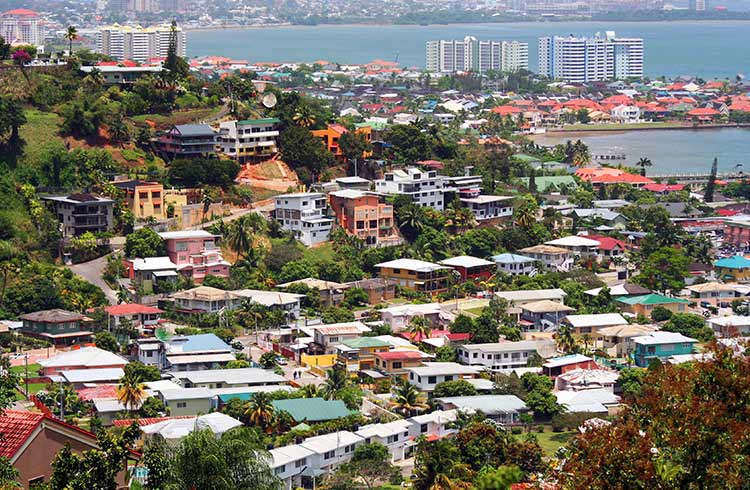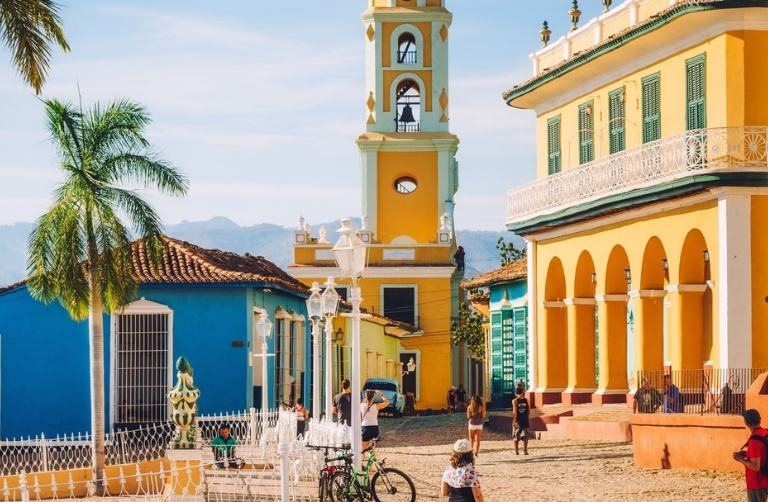Is Trinidad and Tobago Safe? 13 Travel Safety Tips
How bad is crime in Trinidad and Tobago? Find out how to travel safely with 13 important tips from our Caribbean safety expert, Diedre McLeod.
 Photo © iStock/jaysunlp
Photo © iStock/jaysunlp
While living in the Caribbean (in The Bahamas and Jamaica), I met diverse people from many islands. Some of my closest friends are Trinidadian, and we love swapping stories about our cultures, mine being Jamaican, and how to stay safe in each other’s home countries.
Here’s what you need to know to stay safe in Trinidad and Tobago.
- Crime hot spots in Trinidad and Tobago
- Accommodation safety
- Airport safety
- Highway robbery
- Bump and rob incidents
- Smash and grab
- ATM crime and scams in Trinidad
- Aggressive hawkers
- Safety tips for women
- Is it safe for LGBTQ+ travelers?
- Local laws to be aware of
- Drug laws and penalties in Trinidad and Tobago
- Safety during Trinidad carnival
Crime hot spots in Trinidad and Tobago
Trinidad and Tobago is a country made up of two Caribbean islands, with vastly different characteristics and different chances of experiencing crime. Trinidad is larger, better suited to travelers who are looking for cities, sightseeing and nightlife. In contrast, Tobago maintains its old Caribbean island charm. These twin cultures offer a unique travel experience in the Caribbean.
A general safety rule of thumb in Trinidad and Tobago, is to sightsee during the day, and to always carry a mobile phone in case of an emergency (if your phone is unlocked, consider purchasing a local sim card during your trip).
There are a few areas of the capital, Port of Spain on Trinidad, that can be dangerous. Communities such as Laventille, Morvant, Sea Lots, South Belmont are prone to violent crime, such as sexual assault, robberies and gang violence, and should be avoided.
Queen’s Park Savannah, one of Trinidad’s largest parks and open spaces, is often lonely during weekdays and travelers might be targets for theft.
However, Queen’s Park Savannah is generally safe during carnival events and on weekends when a small food fair is on where you can try Trinidadian food, such as roti and the famous “doubles” (curried chickpeas wrapped in a spicy flat bread).
Try to resist the temptation to seek out remote beaches, such as Englishman's Bay, Las Cuevas (just beyond Maracas Bay), and King Peter's Bay. Travelers are often targets for sexual assault or robberies at these isolated beaches, especially at night.
Most visits to Tobago are trouble-free and incidents of violent crime are rare.
Accommodation safety
When renting a villa or apartment, make sure there are security measures in place to avoid break-ins:
- Burglar bars on windows
- Outdoor security lighting
- 24-hour security guards
- Ensure all doors and windows can lock in your accommodation.
Airport scams in Trinidad and Tobago
Airports are often a hotspot for criminals who are waiting to take advantage of tired and unsuspecting visitors. There have been unfortunate incidents where travelers have been followed from the airport to downtown Port of Spain, and as far as outside their accommodation, and then robbed.
If you are traveling after dark from Trinidad’s Piarco International Airport, be cautious of your surroundings on your way to the car park or transportation pick-up. If you suspect someone is following you, try to make a detour to a public place, like a restaurant, or call the police.
Highway robbery in Trinidad
Trinidad is well connected by road, but some are more dangerous than others. Beetham Highway, a main road in and out of the city, has been the scene of incidents where cars have been forced to stop when someone runs out onto the road or blocks the way with bricks and debris.
When the car stops, attempts are made to smash the car windows and drivers are robbed of their valuables – and in some cases, violently assaulted.
Avoid stopping, don’t get out of your car, and try to maneuver your way around the debris.
Bump and rob incidents in Trinidad and Tobago
Another thing to look out for while driving in Trinidad and Tobago is ‘bump and rob’ incidents, especially in Laventille. In this situation, thieves will try to get you to stop your vehicle by lightly hitting the back of the car, usually causing only minor damage.
Once the driver of the car that has been hit stops and gets out of the car to inspect the damage, they are robbed. If this happens to you, and the car can still be driven, leave the area before seeking help.
Smash and grab
Smash and grab style theft from cars is also relatively common in Trinidad and Tobago. Always keep valuables out of sight if you leave them in a parked car.
ATM crime and scams in Trinidad
This ATM scam is common for Trinidad in particular: a thin magnetic sheet is placed in the card slot of the ATM. When you insert your card, you won’t be able to withdraw money, nor will you be able to eject your card.
A bystander will approach with advice to enter in your PIN backwards, while watching to see what your PIN number is. As you leave without your card, the thief will then remove the magnetic sheet, which has captured your card, and will also know your PIN number.
Never share your PIN with a stranger. Always inspect an ATM before using to check it hasn’t been tampered with.
If you are lucky, you may be able to pull out the film yourself. If not, cancel your card as soon as possible.
Aggressive hawkers in Trinidad and Tobago
Throughout Trinidad and Tobago there are a lot of street vendors and hawkers. This might be overwhelming, but be stern yet polite while continuing about your business, and they will generally leave you alone.
Safety for women in Trinidad and Tobago
Women may be frequently catcalled by men on both islands. Be firm yet polite – saying ‘good morning’ is usually better than ignoring someone completely. Give short evasive responses and limit smiling, as this might signal to the Trinidadian that you are up for more conversation.
Is Trinidad and Tobago safe for LGBTQ+ travelers?
Same-sex relations are illegal in Trinidad and Tobago. There is legislation that bars LGBTQ+ people from entering the country, however, these laws are rarely enforced and LGBTQ+ relationships are becoming more accepted. Still, the LGBTQ+ community is still generally restricted to underground clubs and socializing. LGBTQ+ travelers, while safe in Trinidad and Tobago, should avoid public displays of affection.
Local laws in Trinidad and Tobago
Fashion faux pas or not, it’s illegal for civilians to wear camouflage clothing in public in Trinidad and Tobago and you can be fined or imprisoned.
Drug laws and penalties in Trinidad and Tobago
In December 2019, possession of up to 30 grams of marijuana/cannabis became decriminalized. Carrying any more than 30 grams of cannabis, or more than five grams of cannabis resin, is an offence and carries a fine of TT$50,000. You are not allowed to smoke in public spaces or while operating a vehicle.
Safety during Trinidad Carnival
Carnival is a big event in Trinidad and Tobago, held in February each year, when tons of visitors arrive to join in the festivities. Unfortunately, it’s also a time when petty crime increases.
Some key safety tips during Trinidad Carnival are:
- Leave your jewelry at home to avoid petty theft. If you are participating and “jumping carnival” as they say in Trinidad and Tobago, then you’ll be wearing bejeweled costumes, so there is no need for anything else
- Travel in groups. Try to carpool or arrange to meet up at a designated location. Use paid car parks wherever possible, and designate an alcohol-free driver or take an authorized taxi (marked with H license plate, or labelled Maxi taxis) back to your accommodation
- Never walk to or through isolated or poorly-lit areas on your own
- Stash your cash wisely, and only take small amounts with you
- Do not accept drinks from strangers or leave drinks unattended. Make sure all bottles are opened in front of you
- Limit your alcohol intake
- Keep a close eye on your kids. Carnival in Trinidad and Tobago is a family affair and children “play mas” (wear elaborate costumes) and participate in Carnival, too. Make sure children have identification on them with their name, parent’s or guardian’s name, and a contact number
- Keep your phone close and in a waterproof case so it doesn’t get damaged by the water trucks that spray people during the carnival parade. Ensure emergency numbers are pre-loaded or on speed dial
- If someone begins to dance (locally known as a “wine”) behind you but you’re not in the mood for attention, just tap their hands and stop dancing. They usually go away.
Related articles
Simple and flexible travel insurance
You can buy at home or while traveling, and claim online from anywhere in the world. With 150+ adventure activities covered and 24/7 emergency assistance.
Get a quote

2 Comments
Hi everyone, Thanks for the information. I was planning to relocate to Trinadad & Tobago ending of this month but after going true this informations i am now scared and i find a beautiful lady there to marry. But how about their girls? Do they have problem?
A lot of the above is from Trini's, not surprisingly there's a ton of unimpressive comments trying to make the country sound really scary. If you didn't know Trini's are like Jamaicans --- both are obsessed with trying to prove they rank #1 for crime. The only Caribbean country that's anywhere near such a distinction is Haiti.
World’s most homicidal countries A to Z (latest)
Afghanistan
Burkina Faso
Central African Republic
Haiti
Libya
Mali
Papua New Guinea
Somalia
South Sudan
Venezuela
Source: USGOV